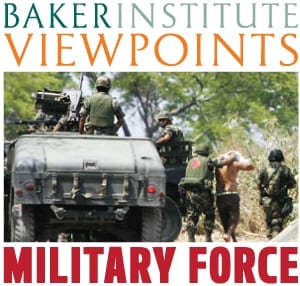While on the campaign trail, Enrique Peña Nieto — now Mexico’s president — sought to de-emphasize the military’s role in the drug war by supporting the creation of a national gendarme and the widespread expansion of the Todos Somos Juarez, a civil society development plan. Yet the proliferation of vigilantes taking up arms to purportedly defend their villages against drug-related violence recently forced the federal government to send soldiers to Michoacán. Like his predecessor, Felipe Calderón, Peña Nieto seems poised to again put his country’s military front and center in the fight against cartels. In the last of a five-part Baker Institute Viewpoints series, we evaluate a fundamental question for all democratic societies facing organized crime threats: Is the deployment of troops in a domestic conflict with organized crime an appropriate use of combat forces?
While interning at a D.C. think tank in 2007, I had a conversation with a top Latin America fellow in which we came to a simple conclusion: Criticizing Mexico’s use of the military in counter-narcotics operations was well and good, but without a viable alternative there was no good policy option but the military to quell violence in the short term. Six years, 100,000 dead (See Molly Molloy on why the 60,000 official number is likely a gross low-ball) and a new president later, we are all having the same conversation about the use of the military in what should be a civilian police issue.
What’s more, we are having this conversation about the same place in Mexico, Michoacán, where the La Familia Michoacána cartel and its violent offshoot, the Knights Templar, hold increasing sway. Their abuses of the local populations have triggered the rise of “vigilante” paramilitary groups that claim to defend the local populations. While in some instances this is no doubt the case, it is also likely that some of these vigilante groups are paramilitaries sponsored by rival cartels, as the government now claims. Once again federal troops and law enforcement will be dispatched to troubled Michoacán — none too soon, given that organized crime elements have likely decapitated two members of vigilante groups.
Resilient cartels
Despite the use of the military, the major cartels present in 2006 at the dawn of the Calderón administration continue to function. Those who argued that the Zetas and Gulf Cartel were both about to die have been proven wrong. It appears that while many of their leaders were killed or arrested, they continue to function and challenge the state and each other. The Sinaloa Cartel is widely regarded as having been left untouched, with the exception of a few high level arrests by both the old and new administrations. The Tijuana Cartel, also known as the Arellano Felix Organization (AFO), continues to function in a more low profile fashion despite claims by U.S. prosecutors that they are “a shadow of their former selves.” U.S. Attorney attempts to declare victory by simply renaming the AFO remnants, the Fernando Sanchez Organization, in a 2010 Luz Verde indictment of 43 members now appear over-exuberant. The Sinaloa Cartel was, however, able to annex cells in the Tijuana plaza and establish a presence. Despite setbacks, the Juarez Cartel and Beltran Leyva Organization also continue to function, in some cases challenging the Sinaloa Cartel inside the state of Sinaloa, its traditional area of control.
Impunity?
Some have argued that the real problem in Mexico is government and criminal impunity. This is so obviously true as to be nothing more than a platitude. The state has no effective capacity to stop criminals because of a weak judicial, penal and law enforcement system. The security apparatus also lacks oversight and accountability mechanisms.
The real question is, how does it get fixed? How can the capacity of law enforcement be improved more rapidly? How can reforms be designed to outlast six-year presidential administrations? What is with Mexico’s obsession with rearranging law enforcement organizational charts and creating new institutions composed of the same individuals?
Mexico’s 2008 judicial reforms are being implemented, but this process will likely take decades. Salaries of security personnel must be increased in conjunction with improved vetting. More money and better personnel will require more taxation and important reforms. So far the only tax reforms proposed appear highly regressive. Regressive taxation could at once improve state capacity while simultaneously increasing the incentives for individuals to join criminal gangs by making formal economic participation too costly.
A possible way forward
An obvious solution would be to accept the necessity of the military in the short term, with the stated goal of replacing it in the medium and long term. This could be accomplished by setting time lines for troop withdrawals and working to build local, state and federal law enforcement capacity. Capacity could be monitored through clear metrics assessing the quantitative and qualitative capacity of law enforcement. The critical element is setting a clear removal date for the military. Does this sound familiar? Comparisons to U.S. troop withdrawals in Iraq and Afghanistan notwithstanding, using the army to buy time for improved federal police was generally Mexico’s plan when this began in late 2006. It appears we have a problem of implementation.
On the other hand, the high coercive costs of the use of the military and law enforcement could, over time, be mitigated by the reevaluation of current drug prohibition policies. The Organization of American States has released a new two-part report on “The drug problem in the Americas,” demonstrating that reevaluating the current global drug policy is no longer a fringe position. Let us hope the debate will be taken seriously.
Read the previous posts in this series:
- Why Mexico’s military is fighting the country’s drug war
- A never-ending mission: Soldiers as police in Mexico
- Mexico’s military plays a necessary role in internal security
- Can Mexico be in an ‘armed conflict’ with criminal gangs?
Nathan Jones is the Alfred C. Glassell III Postdoctoral Fellow in Drug Policy at the Baker Institute. His areas of interest include U.S.-Mexico security issues, illicit networks and cross-border flows.

